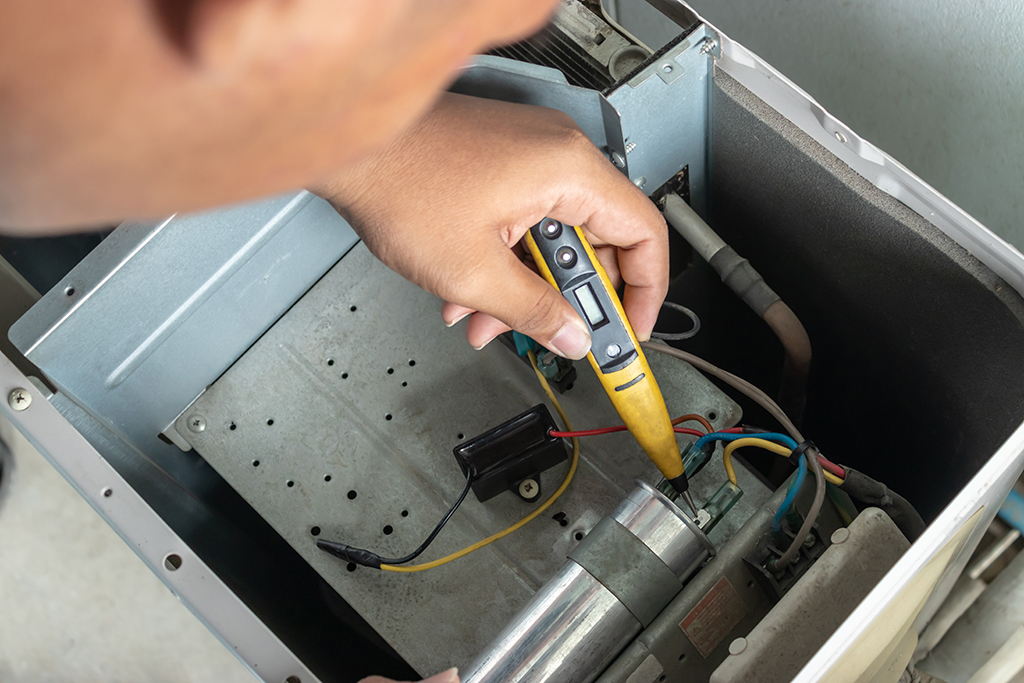
Air Compressor Capacitor is a vital component in an air compressor system, as it is responsible for providing the required starting torque to power up the motor. Without it, the motor would struggle to start, leading to decreased efficiency and potentially causing damage to the system.
The capacitor stores electrical energy, which is then discharged to provide a boost to the motor during start-up. It is important to select the correct capacitor size, as using one that is too small can lead to insufficient starting torque, while using one that is too large can result in excess strain on the system and potentially cause damage.
To ensure optimal performance, it is also important to regularly check and maintain the capacitor. This can include:
- Cleaning to remove any dirt or debris buildup
- And testing for proper operation.
A damaged or faulty capacitor should be replaced immediately to prevent further harm to the system. If you’re new to air compressors and do not know much about its capacitor, worry not.
In this article, we’ll discuss the basics of air compressor capacitors, how to select the proper one for your system and ways to maintain it for optimal performance.
Role of a capacitor in an Air Compressor
First things first, let’s understand what the role of a capacitor is in an air compressor system. The capacitor acts as a storage device for electrical energy, which is then discharged to provide a boost to the motor during start-up. This is necessary as air compressors can require a large amount of starting torque, which the motor may not be able to provide on its own.
Without the capacitor, the motor would struggle to start and may even fail completely, leading to decreased efficiency and potential damage to the system.
Selecting the Proper Capacitor
When selecting a capacitor for your air compressor system, it is important to choose one that is properly sized. Using a capacitor that is too small can lead to insufficient starting torque, while using one that is too large can result in excess strain on the system and potentially cause damage.
To determine the proper size for your system, consult the manufacturer’s recommendations or a professional technician. You can also consider the following factors while choosing the right one :
Motor horsepower:
The higher the horsepower, the larger the capacitor will need to be. An average homeowner air compressor will usually require a 3-5 horsepower motor, while industrial or commercial systems may require upwards of 10 horsepower or more.
Voltage:
The capacitor should match the voltage requirements of your system. In most cases, this will be either 110 volts or 220 volts.
Frequency:
The frequency refers to how often the capacitor will discharge, typically 60 Hertz for domestic systems and 50 Hertz for international usage.
Maintaining the Capacitor
To ensure optimal performance, it is important to regularly check and maintain the capacitor. This can include cleaning to remove any dirt or debris buildup, as well as testing for proper operation. A damaged or faulty capacitor should be replaced immediately to prevent further harm to the system.
When performing maintenance on the capacitor, always make sure to disconnect and discharge it first before handling it. This can be done by shorting the terminals with a screwdriver or using a discharge unit.
What Makes a Good Capacitor
When selecting a capacitor for your air compressor system, it is important to choose one that has good quality.
- Look for a capacitor with a high operating temperature, as this indicates its ability to handle the strain of the system.
- It should also have a long life and be resistant to corrosion.
- The capacitor should also be UL (Underwriters Laboratories) certified, indicating that it meets safety standards.
It is worth investing in a good quality capacitor to ensure the longevity and efficiency of your air compressor system. If you want to learn more about Air Compressors then you can learn from AirCompressorPlus Blog.
Some FAQs (Frequently Asked Questions about Air Compressors and Their Capacitors
Q: Can I replace the capacitor myself?
In most cases, it is recommended to consult a professional technician for replacing the capacitor. However, if you have experience and knowledge in handling electrical components, you can try replacing them yourself.
Q: How often should I replace the capacitor?
This will vary depending on the quality and usage of the system. It is recommended to regularly check and potentially replace the capacitor as needed, especially if it shows any signs of damage or malfunction.
Q: Can I use a different capacitor than what is recommended by the manufacturer?
It is best to choose a capacitor that matches the requirements and specifications of your air compressor system. Using a different size or type of capacitor can lead to system damage and decreased performance.
Overall, the capacitor plays a crucial role in starting and running the motor of an air compressor system. Proper selection and maintenance of the capacitor can ensure optimal performance and longevity of the system.
